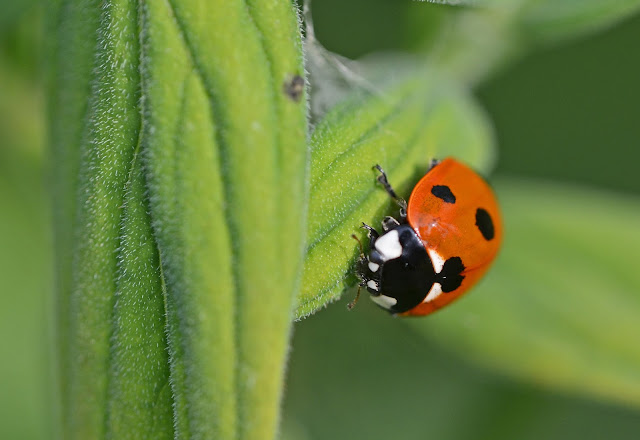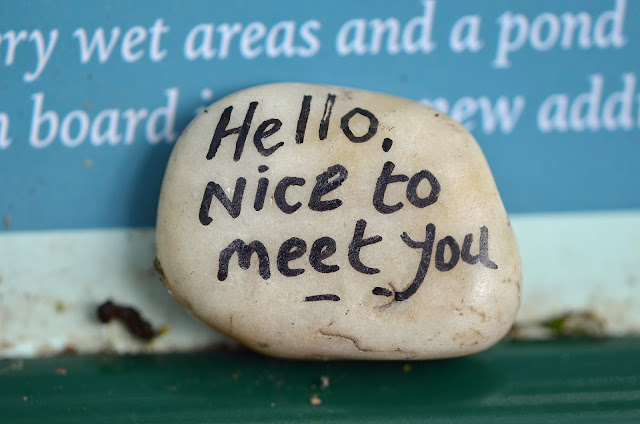Time: from 8:30 a.m.
Weather: dry, sunny, moderate wind, 16°C to 18°C
This
was my first visit to Noak Bridge Nature Reserve since 27th May 2020 due to
having the use of a rental car from 30th May to 4th June 2020 inclusive and
therefore wildlife watching elsewhere in Essex and further afield …. plus some relatively
poor weather …. plus visiting the area around St. Nicholas Church more
frequently to watch and photograph a Red Fox family.
It was
nice to return to Noak Bridge Nature Reserve and I had a productive morning
visit.
Whilst
there are still birds singing, the frequency and intensity of spring song to
attract mates and defend territories has reduced considerably as adult birds
concentrate on attending their nests and rearing their young. What is now evident
is the assortment of bird calls, particularly from the numerous fledglings of Blue
Tit, Great Tit and Long-tailed Tit.
I was able to add 2 bird species to my site list,
bringing the total to 33 species: House Martin (7 flying over) and Swift
(heard only on 3 separate occasions).
Whilst watching
the House Martins, a Sparrowhawk drifted in to view.
I saw 2 Blackcaps,
including a singing male and a red-headed female (which I rarely see) plus I
heard 3 other singing males. In addition, I saw 2 singing male Chiffchaffs
and heard another plus I saw a Great Spotted Woodpecker and heard another.
There was
a male and female Mallard on Puckles Pond.
I recorded
and photographed 2 butterfly species on my visit, both of which were new records for my
site list taking it to 11 species: Large Skipper (at least 4) and Meadow
Brown (at least 8). Both these species were mainly favouring the grassy
area just to the east of the junction of the main track with the track down
from the Eastfield Road entrance although I did see a single of each species
elsewhere on the reserve.
In the
same area, I saw a Blue-tailed Damselfly and one of the smaller blue
damselflies, either Common Blue Damselfly or Azure Damselfly.
The area around
the Meadow Link to Fox Pond was alive with insects including a variety of bees,
hoverflies, flies and beetles, most of which I could not identify.
Species
recorded during this visit were as follows (heard only records in italics):
Swift
House Martin
Blackcap
Chiffchaff
Blue
Tit
Great
Tit
Long-tailed
Tit
Robin
Wren
Dunnock
Blackbird
Song
Thrush
Sparrowhawk
Great
Spotted Woodpecker
Woodpigeon
Jay
Magpie
Mallard
Large Skipper
Meadow Brown
Blue-tailed Damselfly
Blue damselfly sp.
Here are some photos from my visit:
Photo: Large Skipper
Photo: Meadow Browns
Photo: Meadow Browns

Photo: Bumblebee species
Photo: Bumblebee species
Photo: Bumblebee species
Photo: Hoverfly species
Photo: Hoverfly species
Photo: Hoverfly species
Photo: Hoverfly species
Photo: Hoverfly species
Photo: Hoverfly species
Photo: Hoverfly species
Photo: Hoverfly species
Photo: ladybird larvae (presumed Seven-spot Ladybird)
Photo: Seven-spot Ladybird
Photo: False Oil Beetle
Photo: False Oil Beetle
Photo: Common Mallow
Photo: Common Mallow
Photo: Branble
Photo: Wild Rose
Photo: Wild Rose
Photo: Common Milkpea
Photo: Meadow Browns
Photo: Meadow Browns

Photo: Meadow Brown
Photo: Meadow Brown
Photo: Blue-tailed Damselfly
Photo: Bumblebee species
Photo: Bumblebee species
Photo: Bumblebee species
Photo: Hoverfly species
Photo: Hoverfly species
Photo: Hoverfly species
Photo: Hoverfly species
Photo: Hoverfly species
Photo: Hoverfly species
Photo: Hoverfly species
Photo: Hoverfly species
Photo: Seven-spot Ladybird
Photo: Seven-spot Ladybird
Photo: False Oil Beetle
Photo: Shieldbug species
Photo: Common Mallow
Photo: Branble
Photo: Wild Rose
Photo: Wild Rose
Photo: Red Clover
Photo: Common Milkpea
Site
totals to date:
Birds =
33
Mammals = 1
Butterflies=
11
Dragonflies
and damselflies = 6
Reptiles =
1
Amphibians
= 0
💚🦆
🦉 🌼 🌳💚
Stay safe, stay well, stay strong, stay connected with nature





































another stunning set of photos!
ReplyDeletehoverfly IDs (by Ranger Mark Williams) - Myathropa florea (Batman hoverfly) (first 7 photos), Sphaerophoria scripta (female) (the long hoverfly) (next 2 photos), and Helophilus pendulus (sun fly, the footballer) (the last photo)
ReplyDeletecould the damselfly be a female common blue? (but not sure what form - typical/blue/green)
ReplyDelete